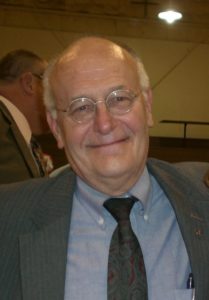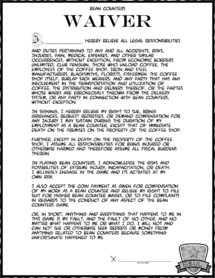
7th Circuit Speaks On Concurrent Conflict Waivers
Focus on Legal Ethics
Sharp  Thinking
Thinking
No. 150 Perspectives on Developments in the Law from Sharp-Hundley, P.C. April 2018
7th Circuit Speaks On Concurrent Conflict Waivers
By John T. Hundley, john@sharp-hundley.com, 618-242-0200
Client waivers of concurrent conflicts of interest are ineffective if a lawyer cannot reasonably believe that he will be able to provide competent and diligent representation to each affected client, the Seventh U.S. Circuit Court of Appeals has held.
Ruling in Doe v. Nielsen, 883 F.3d 716 (7th Cir. 2018), the court said  representation is prohibited notwithstanding informed consent if a court cannot reasonably conclude that the lawyer will be able to provide competent and diligent representation.
representation is prohibited notwithstanding informed consent if a court cannot reasonably conclude that the lawyer will be able to provide competent and diligent representation.
In Nielsen, Doe was seeking permanent resident status under the visa program that considers a foreigner’s investment of capital in a new commercial enterprise in the United States. Doe had invested $500,000 in an unfinished memory care facility, through the law firm that was representing him in his visa case. In the midst of that case, the Securities & Exchange Commission sued the firm’s principal, accusing him of defrauding at least 226 immigrant investors who participated in the visa program. It alleged he had misappropriated funds received for the facility at issue.
 Although the firm submitted an affidavit from Doe waiving any conflict of interest, the Seventh Circuit proceeded to disqualify it from the visa case. It identified two conflicts which it said were non-waivable.
Although the firm submitted an affidavit from Doe waiving any conflict of interest, the Seventh Circuit proceeded to disqualify it from the visa case. It identified two conflicts which it said were non-waivable.
First it said the firm had an incentive to reject lines of inquiry or argument that may have helped Doe’s case, such as by alleging fraud by the firm. In this respect, the court seemed to treat the firm as if it were an adverse client under Illinois Rule of Professional Conduct 1.7(b)(1).
Second, the court said the firm’s duties to other investors created a conflict, because its duties to the 226 investors exceeded available moneys, pitting one against another for available funds. “No lawyer could reasonably continue the representation under these circumstances,” the court said.
In its result and reasoning, Nielsen implicitly emphasizes the word “reasonable” which appears in Rule 1.7(b)(1). Often lawyers think that if both they and the clients say the concurrent representation is okay, that closes the matter. Nielsen rejects that logic by making the test what a court, not the self-interested lawyer, would believe.
“Screening” Doesn’t Apply to Existing Lawyers
“Screening” is not available to insulate existing members of a law firm from each other’s potential conflicts of interest, a recently-issued Illinois State Bar Association Advisory Opinion concludes.
In Opinion No. 18-02, the ISBA dealt with a two-partner law firm but its conclusion seems to have special implications for large firms. In essence, the ISBA concludes that the screening procedures permitted by Illinois Rule of Professional Conduct 1.10(e) apply only “when a lawyer becomes associated with a firm”, language not present in the comparable Model Rules of the American Bar Association.
“[N]otwithstanding the fact that ABA Model Rule 1.10’s screening provision may apply more broadly to permit screening of attorneys subsequent to when they are joining the firm, the Illinois screening provision applies only when a newly associated lawyer is joining the firm,” the ISBA said. Accordingly, the ISBA concluded, screening is not available in other circumstances.
may apply more broadly to permit screening of attorneys subsequent to when they are joining the firm, the Illinois screening provision applies only when a newly associated lawyer is joining the firm,” the ISBA said. Accordingly, the ISBA concluded, screening is not available in other circumstances.
“Screening” refers to procedures adopted within a law firm to assure that documents, information and personnel associated with the firm’s representation of one client are not shared with personnel representing a conflicting client of the firm, and vice versa.
ISBA Advisory Opinions are not binding on courts or disciplinary agencies, but they often are considered by such bodies in assessing lawyer conduct.
“Everybody Does It” No Defense To Disbarment
An “everybody does it” defense has been rejected by the Seventh U.S. Circuit Court of Appeals in the appeal of a bankruptcy lawyer from a disbarment decision.
 In In re Husain, 866 F.3d 832 (7th Cir. 2017), the practitioner was found to have signed clients’ names to documents that debtors must verify under penalty of perjury; copied and reused clients’ signatures so it appeared they had signed documents they had not seen; applied forged or copied signatures to documents that did not reveal all of debtors’ assets; submitted documents that omitted material assets; and lied on the stand.
In In re Husain, 866 F.3d 832 (7th Cir. 2017), the practitioner was found to have signed clients’ names to documents that debtors must verify under penalty of perjury; copied and reused clients’ signatures so it appeared they had signed documents they had not seen; applied forged or copied signatures to documents that did not reveal all of debtors’ assets; submitted documents that omitted material assets; and lied on the stand.
Responding to the argument that everyone does it, the court said that that “might mean that more disciplinary proceedings are in order; it would not exculpate Husain.”
Husain petitioned for review by the U.S. Supreme Court but his petition was denied.
SHARP-HUNDLEY, P.C.
1115 Harrison, Mt. Vernon, IL 62864 • Telephone 618-242-0200 • Facsimile 618-242-1170
www.sharp-hundley.com
Business Transactions • Litigation • Financial Law • Problem Finances • Real Estate • Corporate • Commercial Disputes
Creditors’ Rights • Arbitration & Mediation • Estate Planning • Probate • Appeals
150
